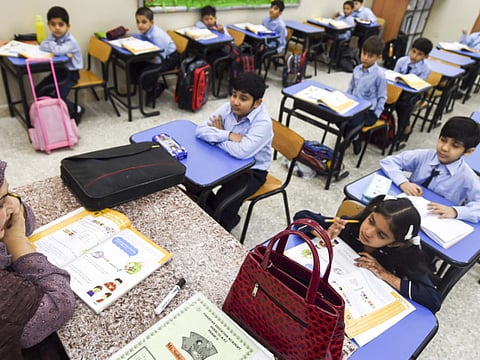UAE schools take first steps in Moral Education
One hour per week set aside for new subject, with student progress to be monitored by authorities

Dubai: Schools have started teaching the new Moral Education subject this academic year, with student progress to be monitored by schools and authorities.
The subject has become mandatory for all UAE schools, starting with grades one through nine this academic year. In the next academic year, schools will teach Moral Education in all grades.
Moral Education is a national initiative announced in 2016 by His Highness Shaikh Mohammad Bin Zayed Al Nahyan, Crown Prince of Abu Dhabi and Deputy Supreme Commander of the UAE Armed Forces.
The programme breaks new ground in that it is not limited to textbooks, classrooms or exams. Schools are free to implement whatever steps they want to achieve the goals of the new subject, which will be monitored by authorities as part of overall student development evaluations, which are already included in official school inspections.
Although there will be no conventional exams, schools said they will assess student progress in the subject.
Moral Education is based on four pillars: Character and Morality; The Individual and the Community; Civic Studies; and Cultural Studies. For each pillar, there is “a structured sequence of units for grades one through nine”, according to the Dubai School Inspection Bureau.
The UAE’s biggest private school groups, such as GEMS Education and Taaleem, confirmed to Gulf News they have started teaching the units, discussing specific aspects of implementation. In Dubai, the Knowledge and Human Development Authority (KHDA) has also shared broad guidelines.
Roll-out
Schools must allocate an hour (60 minutes) per week for the subject. The KHDA said schools have already received an electronic version of the subject book, which serves as a base to build more content. Schools said they have assigned Moral Education teachers and coordinators.
According to the KHDA’s School Inspection Supplement (2017-18), Moral Education “may be taught in Arabic, English, another language of instruction or an appropriate combination of these”.
Stuart Walker, head of School and CEO of GEMS World Academy — Dubai, said the IB curriculum school will have a school-wide School Moral Education Coordinator as well as an Elementary and Secondary leader. “However, every stakeholder within GEMS World Academy – Dubai is responsible for Moral Education delivery and implementation within our community,” he added.
“A plethora of interactive teaching resources will be used, including multimedia and online resources provided by the Ministry [of Education] and the schools’ counselling and emotional well-being coordinators … This academic year, schools will map out how the four pillars of Moral Education for Grades 1 to 9 are delivered within the curriculum. In the next academic year, all grades will have the 66 units mapped and assessable. Resources will also be provided by the KHDA Moral Education Team.”
At Taaleem, all schools have been trained in Moral Education and are “currently mapping the curriculum against their current programme of learning”, said Clive Pierrepont, director of communications at Taaleem.
A minimum of two staff members from each school have attended the national training and all schools have conducted in-house training for all staff. All principals and heads of schools received internal training at the beginning of August.
“Working teams are busy mapping the curriculum and looking at requirements per grade levels,” Pierrepont said.
All Taaleem students from Grades 1 to 9 (Year two to 10) will complete the subject units as per the set for 2017-18. Grades 10 to 12 will be introduced the next school year, with each implemented unit “working as a building block for future units”.
Meanwhile, the required 60 minutes of Moral Education per week can also “be interwoven into the current curriculum as it fits best”, Pierrepont said.
Discussing the four pillars, he said: “Through these, students will learn about themselves and the family, friends, peers. They will focus on values such as fairness, affection, tolerance, equality, appreciation, compassion and empathy. They will also look at features of the government, conflict, trade and travel, and many other areas based around the four pillars.”
Pierrepont also explained that though there will be no exams relating to Moral Education, “it will be assessed, however”. “Assessment will focus on formative and summative assessments of the students’ personal, social and emotional progress as they learn about values, morals, civics and cultural studies.”
Student and teacher books have been developed and will be distributed by the end of September for all schools, he added.
Fatima Belrehif, CEO of KHDA’s Dubai School Inspection Bureau, also highlighted the flexibility of the new subject, pointing out “each school is given flexibility to integrate the guidelines in ways that best suit its specific curriculum”.
Belrehif added that for “KHDA [governed] schools, implementation will be monitored during inspection visits, when we will evaluate curriculum, teaching, learning and assessment”.
Moral Education at a glance
Moral Education is a national initiative announced in 2016 by His Highness Shaikh Mohammad Bin Zayed Al Nahyan, Crown Prince of Abu Dhabi and Deputy Supreme Commander of the UAE Armed Forces.
Its four pillars are Character and Morality, The Individual and the Community, Civic Studies, and Cultural Studies.
For each pillar, there is a structured sequence of units for Grades 1 to 9 this school year. In the next school year, all grades will teach the units.
Schools must allocate 60 minutes per week for the subject.
An electronic version of the subject book have been sent to schools in Dubai.
Moral Education may be taught in Arabic, English, “another language of instruction or an appropriate combination of these”.
Schools have appointed teachers and coordinators for Moral Education.
There will be no exams, but student progress will be monitored by schools and authorities during school inspections.



